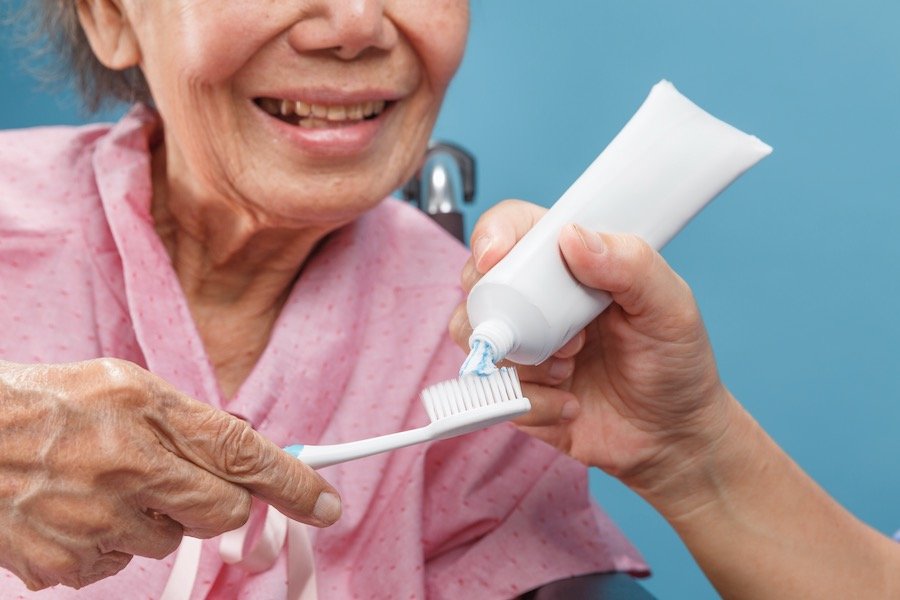Dietitian Blog, Long-Term Care, MNT Guidelines, Nutrition Support | Oct 14 2020
Making oral health a priority for NPO patients

One of the leading causes of death in long-term care facilities is pneumonia.1 Patients with severe dysphagia are at a higher risk of developing aspiration pneumonia, even if they receive tube feeding as their primary source of nutrition. Patients with oral motor dysfunction are unable to clean their mouths via natural meals, and dried secretions from the mouth accumulate with harmful bacteria and pathogenic organisms. Patients with dysphagia and poor oral care may aspirate the saliva filled with pathogens into their lungs. This can cause upper respiratory illnesses such as aspiration pneumonia.
Oral care…it really works!
Patients who do not eat by mouth need just as much oral care, if not more, than a patient who consumes an oral diet. An aggressive oral care protocol will help to reduce the bacterial load and pathogenic organisms in the mouth. A retrospective study investigated the effect of an oral care protocol on bedridden, tube fed patients. The oral care protocol consisted of tooth/tongue brushing using a toothbrush, oral sponge brush and chlorhexidine solution, followed by a gel to moisturize the inner mouth and a salivary gland massage. All three steps of the intervention were performed routinely, while the control group received oral care less often and not as effectively. The results of this study showed that a planned oral hygiene protocol not only helps to reduce the incidence of pneumonia, but it can also reduce hospital costs for patients who are unable to eat by mouth.
How to implement an oral care protocol
Patients should have a daily assessment of their mouths. The first step in an oral health protocol is to determine how often your patient’s teeth should be brushed. The majority of patients should have their teeth brushed at least twice a day, but some may need it more often to prevent the formation of bacteria and plaque. When brushing an NPO patient’s teeth, a soft toothbrush with the ability to suction oral secretions should be utilized. By suctioning oral secretions while brushing a patient’s teeth, the risk of aspirating microorganisms and bacteria is reduced. After the teeth are brushed, an alcohol-free or hydrogen peroxide-based mouth rinse should be applied to clean the mouth and remove respiratory pathogens. For NPO patients, a water-based mouth moisturizer with vitamin E can help protect the tissue in the mouth and help heal oral lesions.
The dietitian’s role
Registered dietitians (RDs) can incorporate oral health screening into their nutrition assessment. Oral health and nutrition have a direct relationship. Many systemic diseases such as diabetes, autoimmune disorders, and cardiovascular disease have links to oral health and nutrition. As dietitians, we have been taught to counsel our patients on the dietary factors that increase their risk of poor oral health. This is especially true in high-risk populations, including young children and the elderly. Dietitians who work with patients who do not eat by mouth should work with nurses to provide education on a proper oral health protocol.
Dietitians On Demand is a nationwide staffing and recruiting company for registered dietitians, specializing in short-term, temporary and permanent-hire positions in acute care, long term care and food service positions. We’re dedicated to dietitians and helping them enhance their practice and excel in the workplace. Check out our job openings, request your coverage, or visit our store today!
References
Marik, P. E., & Kaplan, D. (2003). Aspiration Pneumonia and Dysphagia in the Elderly. Chest, 124(1), 328-336. doi:10.1378/chest.124.1.328
Koichiro U. Preventing aspiration pneumonia by oral health care. JMAJ. 2011;54(1):39-43.
Maeda, K., Akagi, J. Oral Care May Reduce Pneumonia in the Tube-fed Elderly: A Preliminary Study. Dysphagia. 29, 616–621 (2014). https://doi.org/10.1007/s00455-014-9553-6
Schleder, B., & Stott, K. (2002). THE EFFECT OF A COMPREHENSIVE ORAL CARE PROTOCOL ON PATIENTS AT RISK FOR VENTILATOR-ASSOCIATED PNEUMONIA. Journal of Advocate Health Care, 4(1), 27-30. Retrieved September 10, 2020, from https://sageproducts.com/wp-content/uploads/IN10222_The_Effect_of_a_Comprehensive_Oral_Care_Protocol_on_Patients_at_risk_for_ventilator_associated_pneumonia_handout_study.pdf
Touger-Decker R, Mobley C; Academy of Nutrition and Dietetics. Position of the Academy of Nutrition and Dietetics: oral health and nutrition. J Acad Nutr Diet. 2013;113(5):693-701. doi:10.1016/j.jand.2013.03.001
Who we are
Dietitians On Demand is the nationwide leader in providing dietitians with jobs they love. If flexibility, competitive pay, a full benefits package, free CPEUs each month and a team dedicated to dietitians sound good to you, apply to our positions today.




